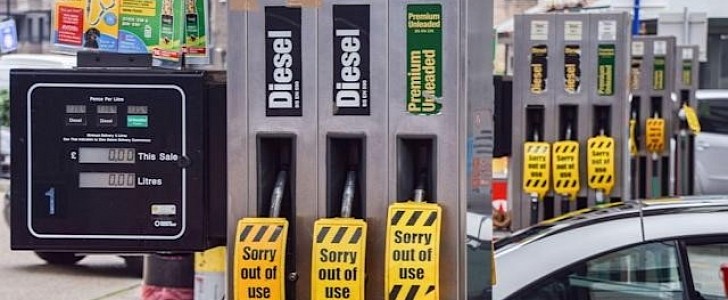Yesterday, I wrote about the results of a study that was published earlier this week, and it regarded the effects of leaded gasoline on American kids and their development between 1940 and 2015. It was not good news, as lead was present in abundance in their blood stream, as data has shown.
In the U.S., passenger cars could not get even a drop of leaded gasoline since 1996, which ended a long process of eliminating leaded fuel from the nation's refueling stations. However, the effects of lead remained for years to come, as the substance was both in the air, the ground, and the water, not to mention in piston-engined aircraft fuel. In the case of the latter, it's still there and called 100LL. There are alternatives to it, though.
What I have come to realize as I was going through the article is that the last country to ban leaded fuel for vehicles was Algeria, which finished its reserves back in Summer 2021. Twenty years before that moment, 117 countries across the world still used leaded gas.
The point I am trying to make is that the issue is not one that is found only in the United States of America, but it is a global problem. I am not a betting person, but I would win a bet if it involved checking similar statistics on lead levels in the blood of people in the countries that have recently stopped using leaded gasoline in vehicles. The problem is there, but there may not be enough or any data to confirm it.
Now, as you might have noted after reading the article on the matter, it appears that exposure to lead in early childhood resulted in a drop in IQ. A 2.6-point drop, mind you, along with other health hazards. Again, this is a global problem, not just an American one.
That is not good news, no matter how you look at it, and to blame for the situation are both politicians of years gone by, who did not rush to eliminate it as fast as they could have, as well as those who came up with tetraethyl lead in the first place.
Mind you, leaded gasoline was not how this fuel was first made but was something developed in the 1920s as a solution to stop engine knock. Its inventor, Thomas J. Midgley, is now considered one of history's most dangerous inventors, as he is also responsible for CFCs (chlorofluorocarbons), another greenhouse gas accelerator.
Midgley worked with Charles Kettering in the Delco research laboratory, which belonged to General Motors. The solution to the knock problem was cheap, which made it attractive in the eyes of investors.
What is mind-boggling today is the fact that people were aware that lead was poisonous even back in 1920. Ironically, even Midgley himself was poisoned by lead, but that did not stop him from putting the stuff in gas and claiming to solve a problem without any downsides. The matter is explained broadly by historians in books like Deceit and Denial, as well as Lead Wars.
With the two parts of the problem present, in the form of the fact that this is a global problem, as well as the fact that deceit may have been used to ensure lead becomes the additive of choice for gasoline, I can only hope that this century will bring better decision making, not to mention quicker decision making.
It is not enough just to ban something that is bad for so many people, as you need to offer alternatives, as well as to ensure you do not enrich a group of individuals from banning something that people wanted. If what I am writing about is unclear, think about the U.S. prohibition, along with Al Capone.
Fortunately, we live in the age of the Internet and the blockchain. I can only hope that the events of this century, as well as decisions made by individuals in science and in power today will not be as bad when viewed a century from now as the ones we are referring to today. As far as the last two weeks have gone, I do not think we are doing so good.
What I have come to realize as I was going through the article is that the last country to ban leaded fuel for vehicles was Algeria, which finished its reserves back in Summer 2021. Twenty years before that moment, 117 countries across the world still used leaded gas.
The point I am trying to make is that the issue is not one that is found only in the United States of America, but it is a global problem. I am not a betting person, but I would win a bet if it involved checking similar statistics on lead levels in the blood of people in the countries that have recently stopped using leaded gasoline in vehicles. The problem is there, but there may not be enough or any data to confirm it.
Now, as you might have noted after reading the article on the matter, it appears that exposure to lead in early childhood resulted in a drop in IQ. A 2.6-point drop, mind you, along with other health hazards. Again, this is a global problem, not just an American one.
Mind you, leaded gasoline was not how this fuel was first made but was something developed in the 1920s as a solution to stop engine knock. Its inventor, Thomas J. Midgley, is now considered one of history's most dangerous inventors, as he is also responsible for CFCs (chlorofluorocarbons), another greenhouse gas accelerator.
Midgley worked with Charles Kettering in the Delco research laboratory, which belonged to General Motors. The solution to the knock problem was cheap, which made it attractive in the eyes of investors.
What is mind-boggling today is the fact that people were aware that lead was poisonous even back in 1920. Ironically, even Midgley himself was poisoned by lead, but that did not stop him from putting the stuff in gas and claiming to solve a problem without any downsides. The matter is explained broadly by historians in books like Deceit and Denial, as well as Lead Wars.
It is not enough just to ban something that is bad for so many people, as you need to offer alternatives, as well as to ensure you do not enrich a group of individuals from banning something that people wanted. If what I am writing about is unclear, think about the U.S. prohibition, along with Al Capone.
Fortunately, we live in the age of the Internet and the blockchain. I can only hope that the events of this century, as well as decisions made by individuals in science and in power today will not be as bad when viewed a century from now as the ones we are referring to today. As far as the last two weeks have gone, I do not think we are doing so good.








